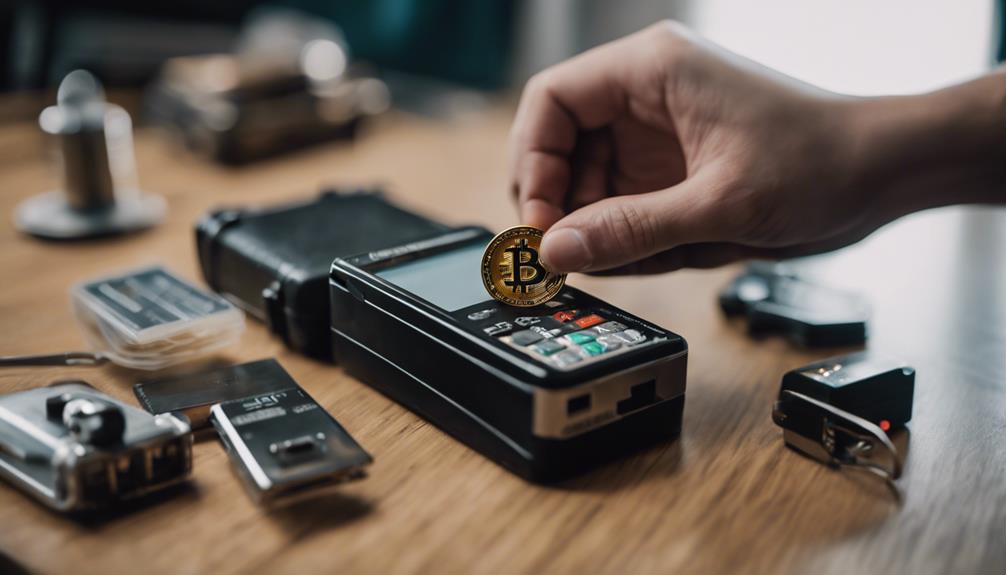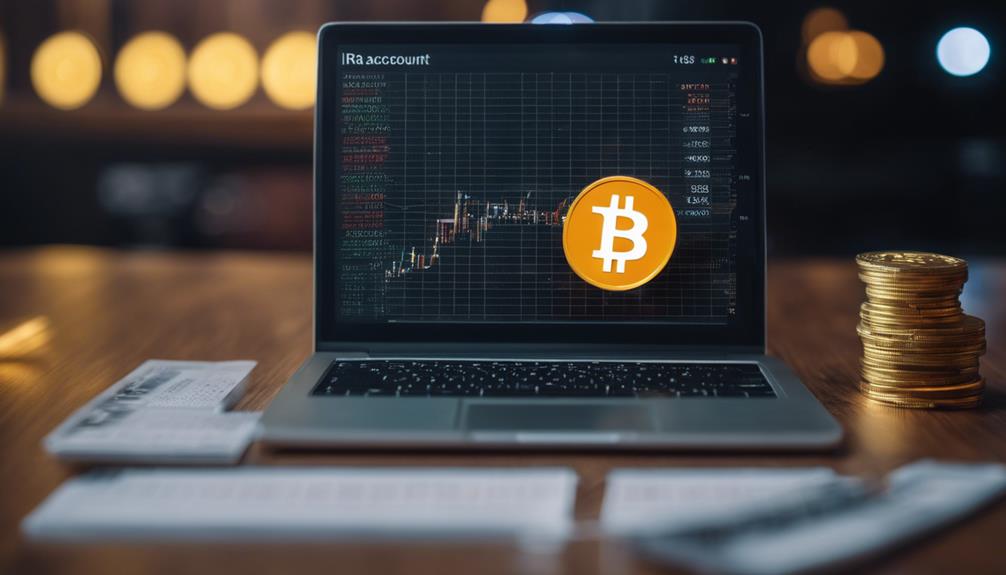When starting a Self-Custody Bitcoin IRA, the first step is to choose a custodian that supports cryptocurrency investments. This will give you control over your financial future while also ensuring compliance with IRS guidelines. Selecting an experienced custodian is important for understanding tax implications and remaining compliant. Investing in an LLC allows for direct ownership of Bitcoin, increasing security and control. It is also beneficial to set up a business checking account to separate personal and IRA assets. Creating a cryptocurrency wallet involves choosing the right type and keeping private keys secure. Direct ownership of Bitcoin eliminates counterparty risk and provides transparency. Be sure to look for transparent fee structures and secure storage options. Protect your Bitcoin IRA investment with a secure digital wallet and multi-signature security.
Key Takeaways
- Establish a self-directed Bitcoin IRA with a custodian.
- Invest in an LLC for direct Bitcoin ownership in your IRA.
- Create a business checking account to manage IRA LLC finances.
- Secure your Bitcoin with a cryptocurrency wallet.
- Enjoy control and security with direct Bitcoin ownership in a self-custody IRA.
Establishing a Self-Directed IRA
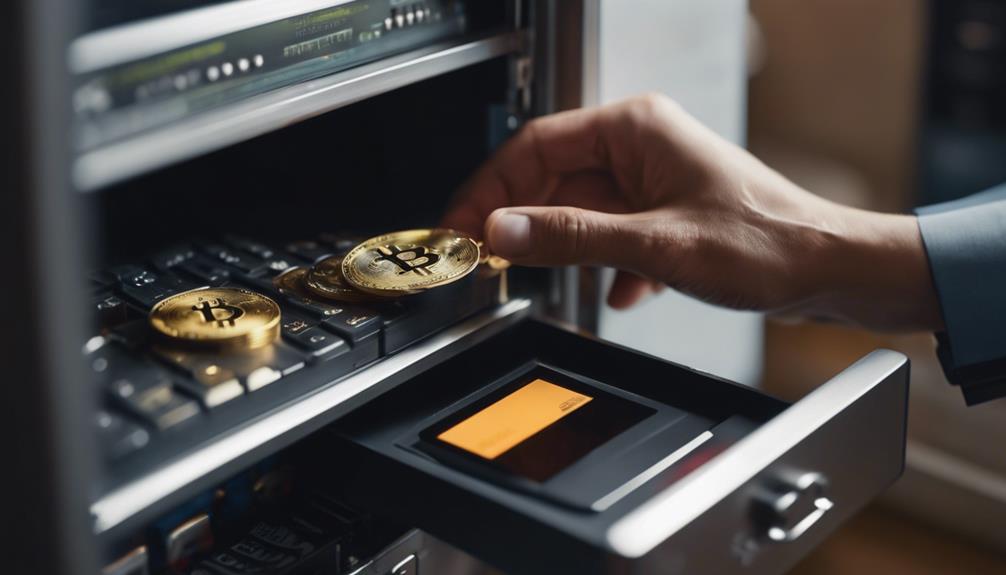
When establishing a Self-Directed IRA, the primary step is selecting a custodian that supports cryptocurrency investments. Investing in alternative assets like Bitcoin through a self-directed IRA offers greater control and flexibility over our financial future.
By adhering to IRS guidelines, we can navigate the complexities of incorporating cryptocurrency into our retirement portfolio. It's important to choose a custodian experienced in handling cryptocurrency investments within an IRA structure to guarantee compliance with regulations and maximize the benefits of this investment opportunity.
Proper documentation and understanding of tax implications are vital aspects to take into account when venturing into the world of self-directed IRAs and cryptocurrency. Taking the time to select the right custodian sets the foundation for a secure and successful investment journey, providing the freedom to explore the potential growth of Bitcoin within the framework of our retirement savings strategy.
Investing in an LLC
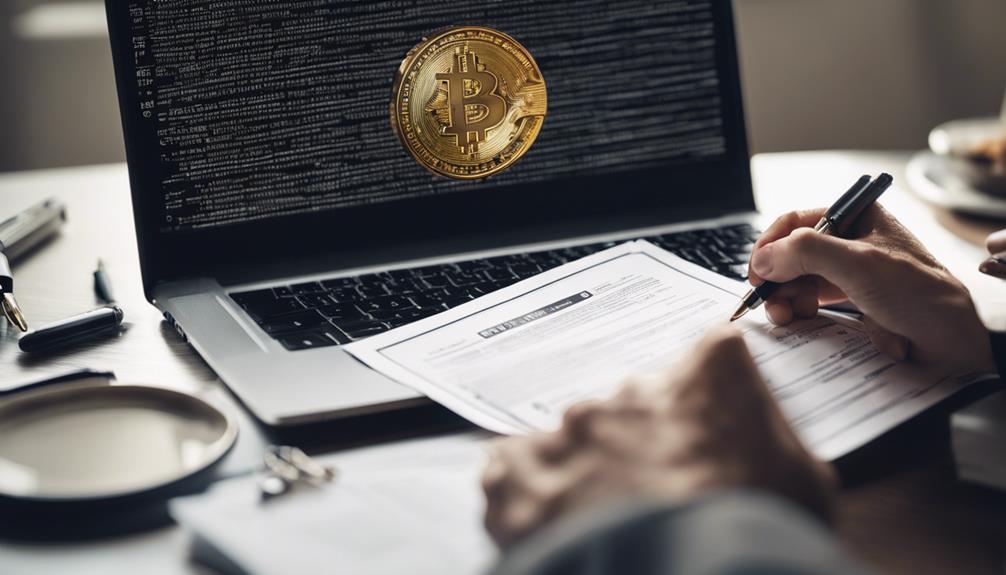
Investing in an LLC within a Self-Custody Bitcoin IRA offers direct ownership of Bitcoin and provides more control and flexibility over cryptocurrency investments.
Setting up an LLC involves establishing a business entity to hold and manage Bitcoin within the IRA, allowing investors to choose preferred wallets for storing and transacting with their assets.
LLC Investment Benefits
Investors gain direct control over their cryptocurrency investments by utilizing an LLC within a Bitcoin IRA. With an LLC structure, self-custody of Bitcoin is enabled, allowing for independent management of cryptocurrency holdings and transactions.
This setup offers flexibility and customization in diversifying cryptocurrency portfolios, giving investors the freedom to tailor their investment strategies according to their preferences. Additionally, utilizing an LLC in a Bitcoin IRA provides added security and control over digital assets, enhancing the overall level of protection for the invested funds.
Risks to Consider
What potential risks should one be mindful of when considering the utilization of an LLC for self-custody within a Bitcoin IRA?
Investing in an LLC for self-custody Bitcoin IRA involves various risks that require careful consideration. Regulatory changes can impact the structure and operation of the LLC, potentially affecting your cryptocurrency investments.
LLC ownership within a Bitcoin IRA may come with additional administrative responsibilities and costs, making it essential to assess the financial implications. Legal liabilities are a concern when managing an LLC for cryptocurrency investments, requiring thorough understanding and compliance with relevant laws.
Adhering to strict compliance measures and seeking guidance from legal and financial professionals are important steps to mitigate risks and ensure the successful self-custody of your Bitcoin IRA through an LLC.
Setting Up a Business Checking Account

When establishing a business checking account for your IRA LLC, it's important to understand the legal requirements for the account.
Selecting the right bank that supports IRA LLCs is vital for smooth transactions.
Organizing necessary documents beforehand will streamline the process and guarantee compliance with regulations.
Legal Requirements for Account
To guarantee compliance with IRS regulations and proper management of assets, establishing a business checking account is an essential step when setting up an LLC within a self-directed IRA.
When setting up a business checking account for your self-directed IRA LLC, keep in mind the following:
- Segregation of Funds: Ensures clear separation of personal and IRA assets.
- Tracking Income and Expenses: Facilitates efficient monitoring of cryptocurrency investment-related transactions.
- IRS Compliance: Helps in adhering to IRS regulations governing IRA investments.
- Financial Structure: Provides a solid foundation for managing assets and transactions within your self-directed IRA.
Setting up a business checking account is vital for maintaining the integrity and organization of your self-directed IRA investments.
Choosing the Right Bank
We recommend prioritizing a bank that specializes in self-directed IRAs and alternative investments when setting up a business checking account for your IRA LLC. It's important to select a bank that offers low fees and convenient online banking services to make managing your investments easier. Confirm that the bank complies with regulations for holding funds in self-directed IRAs and consider their experience with cryptocurrency investments. Here is a comparison table to help you make an informed decision:
| Bank | Specialization |
|---|---|
| ABC Bank | Self-directed IRAs, low fees |
| XYZ Bank | Alternative investments, online services |
| Crypto Bank | Cryptocurrency investments, compliance |
| FinTech Bank | Business checking accounts, regulations |
Organizing Necessary Documents
Gathering essential paperwork is crucial for efficiently establishing a business checking account for your Self-Custody Bitcoin IRA. When setting up the account, make sure you have the following documents ready:
- Personal identification, such as a driver's license or passport
- Proof of address
- Social Security number
- Business formation documents like Articles of Organization or Articles of Incorporation
Having these documents in order will streamline the process of opening a business checking account for your Self-Custody Bitcoin IRA.
Remember to keep copies of all paperwork submitted for account opening in a secure place for future reference and compliance purposes.
Creating a Cryptocurrency Wallet

When setting up a cryptocurrency wallet, selecting the right type is essential for securely managing your digital assets. A cryptocurrency wallet is where you store your digital currencies like Bitcoin. It's important to safeguard your private keys, as they grant access to your funds.
These wallets generate public keys for receiving funds and private keys for authorizing transactions. With cyber threats on the rise, choosing a secure wallet is paramount to protect your digital assets.
Options include hardware wallets like Ledger Nano S, software wallets such as Electrum, mobile wallets like Trust Wallet, and web wallets including MyEtherWallet. Each type offers different features and levels of security, so it's crucial to research and select one that aligns with your needs for safeguarding your cryptocurrencies.
Direct Ownership of Bitcoin
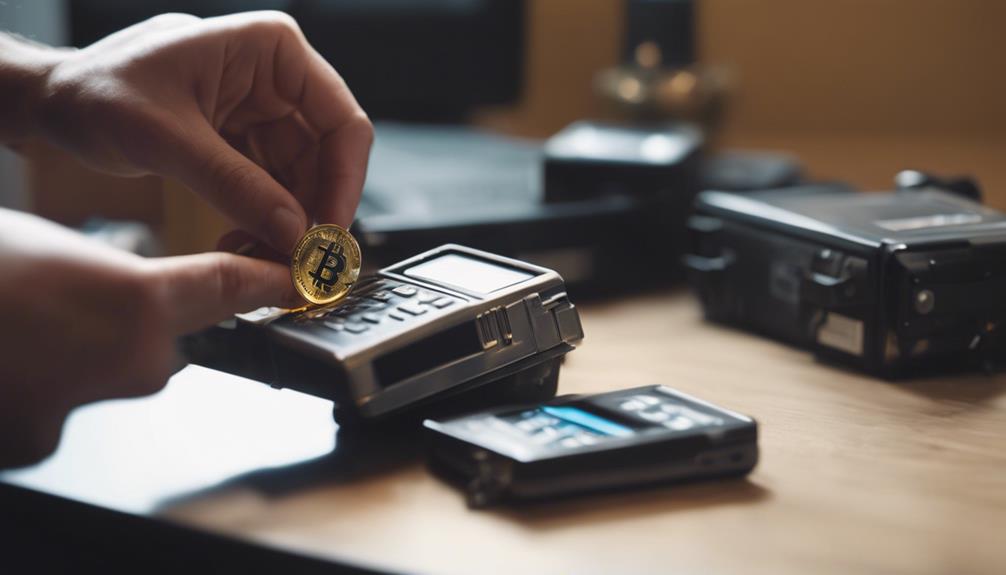
Taking direct ownership of Bitcoin in a self-custody Bitcoin IRA guarantees full control over the private keys. This method empowers us to invest for retirement with confidence and security. Here are some key benefits of direct ownership:
- Secure Digital Wallet: Hold Bitcoin securely in a digital wallet, ensuring complete control over our retirement investments.
- Elimination of Counterparty Risk: By bypassing traditional custodians and exchanges, we mitigate the risk associated with third-party involvement.
- Independent Management: Access, transfer, and manage Bitcoin holdings autonomously, enhancing our sense of financial freedom.
- Transparency and Security: Enjoy peace of mind with transparent and secure methods for storing and managing Bitcoin within a retirement account.
Direct ownership not only offers a way to invest in Bitcoin for retirement but also provides a level of control and transparency that aligns with our desire for financial independence and security.
Working With Reputable Companies
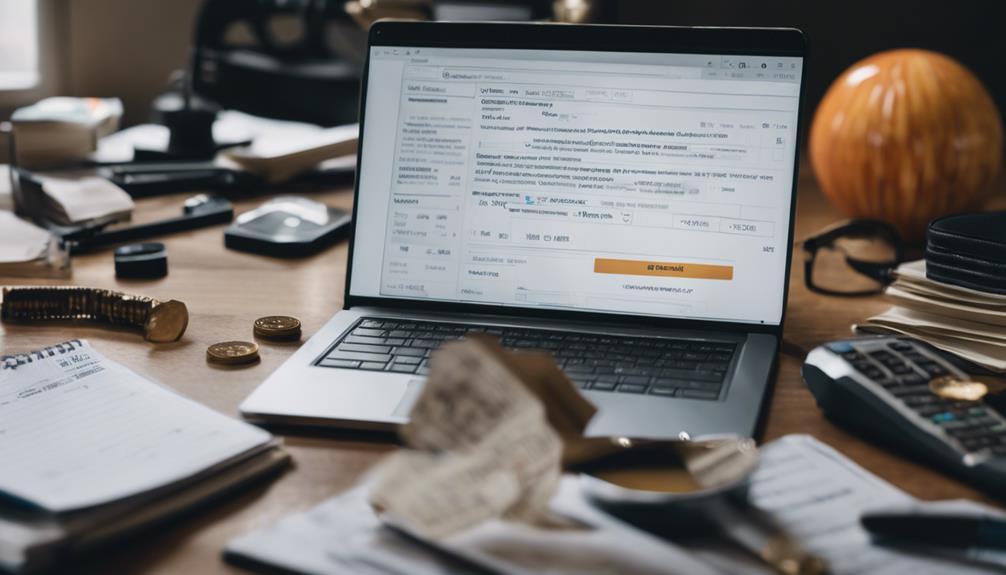
After securing direct ownership of Bitcoin in a self-custody Bitcoin IRA, the next step involves partnering with reputable companies that offer transparent fee structures and secure storage options. When selecting a company for your self-custody Bitcoin IRA, it is important to prioritize security measures, compliance, and customer satisfaction. Reputable companies not only guarantee the safety of your digital assets but also provide easy access to account information and robust customer support. Look for firms that have a proven track record of adhering to industry regulations and offer insurance coverage for the assets held in your IRA.
| Key Considerations | Benefits |
|---|---|
| Transparent fee structures | Understand where your funds are going |
| Secure storage options | Protect your assets from theft or loss |
| Compliance with regulations | Peace of mind regarding legal requirements |
| Robust security measures | Safeguard your investments against cyber threats |
Considering Risks and Security

To safeguard your self-custodied Bitcoin in an IRA, understanding and actively managing the associated risks and security measures is paramount. When considering risks and security for your Bitcoin IRA, it's vital to focus on:
- Private Keys: Controlling your private keys is vital in a self-directed IRA account to prevent unauthorized access to your funds.
- Hardware Wallets: Utilizing hardware wallets adds an extra layer of security by storing your private keys offline, away from potential online threats.
- Multisig Setups: Implementing multisig setups can enhance security by requiring multiple signatures to authorize transactions, reducing the risk of a single point of failure.
- Securely Managing: Properly securing and backing up your private keys is fundamental in protecting your cryptocurrency holdings, ensuring you can access your funds when needed.
Safeguarding Your Investment

Our paramount focus lies in guaranteeing the protection of our Bitcoin IRA investments through strategic safeguarding measures. To safeguard your Bitcoin IRAs, it's vital to utilize a secure digital wallet. By storing your digital assets in a secure digital wallet, you reduce the risk of unauthorized access. Implementing multi-signature security features adds an extra layer of protection, requiring multiple approvals for transactions to go through.
Regularly backing up your wallet is essential to prevent potential data loss. This precaution ensures that even if your primary wallet is compromised, you can still access your funds. Enable strong authentication methods such as biometrics or hardware keys to further secure your Bitcoin IRAs. These advanced security measures make it much harder for unauthorized individuals to gain access to your digital assets.
Lastly, staying vigilant against phishing scams is paramount. Be cautious of fraudulent activities targeting your Bitcoin IRAs and always verify the authenticity of any requests for sensitive information. By following these safeguarding practices, you can protect your Roth IRA investments and enjoy peace of mind knowing your assets are secure.
Frequently Asked Questions
Can You Hold Bitcoin in a Self-Directed Ira?
Yes, we can hold Bitcoin in a self-directed IRA. This allows direct control over our Bitcoin investments, giving flexibility to invest in alternative assets like Bitcoin for potential growth.
Holding Bitcoin in a self-directed IRA can offer tax advantages and diversify our retirement portfolio. We can choose to custody our own Bitcoin or use a trusted third-party custodian for security, ensuring compliance with IRS regulations and secure storage practices.
How Do I Hold Bitcoins in My Ira?
To hold Bitcoins in your IRA, you need to set up a self-directed or alternative asset IRA. This involves investing IRA funds in an LLC to open a business account specifically for Bitcoins. Through this LLC, you can create a secure wallet for easy transactions. Common wallets that can be used for this purpose include Coinbase, Binance, Kraken, and Bittrex. By directly owning Bitcoin through your IRA/LLC structure, you gain secure control over your cryptocurrency investments.
This approach allows for a structured and organized way to manage your Bitcoin holdings within the confines of your IRA, ensuring both security and compliance with relevant regulations.
Is It a Good Idea to Have a Bitcoin Ira?
Having a Bitcoin IRA can be a smart move due to potential tax advantages and exposure to assets like Bitcoin and Ethereum. It offers security with features like $250 million custody insurance.
Over 170,000 users trust BitcoinIRA as the largest crypto retirement platform. Institutional giants like Tesla, Square, and Visa support investing in a Bitcoin IRA. It's a solid option for those seeking diversification and long-term growth potential in their retirement portfolio.
Can I Withdraw Bitcoin From Bitcoin Ira?
Yes, we can withdraw Bitcoin from a Bitcoin IRA, but it's important to adhere to IRS regulations. Taxes and penalties may apply if not done correctly. Seek advice from a tax advisor or financial pro before making any withdrawals.
Proper documentation is essential when withdrawing Bitcoin from a self-custody IRA. Consider the long-term impact of withdrawing Bitcoin from your IRA, including potential tax implications.
Conclusion
To sum up, self-custody Bitcoin IRAs offer a secure and flexible way to invest in cryptocurrency for your retirement. They empower individuals by giving them complete control over their digital assets, eliminating the need for third-party intermediaries. With ultimate bitcoin ira selfcustody, investors can ensure their retirement savings are protected while benefiting from the growth potential of Bitcoin. This approach combines the freedom of decentralized finance with the long-term planning of traditional retirement accounts.
While some may worry about the risks involved, by following the steps outlined in this guide and working with reputable companies, you can safeguard your investment and potentially see significant growth in the long term.
Take control of your financial future and explore the benefits of a self-directed IRA with Bitcoin today.

